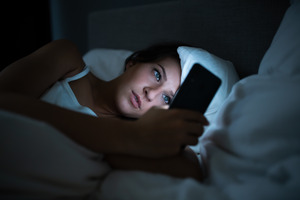
Are you having a hard time getting the quality sleep you deserve? It could be a side effect of sleep apnea, which can disrupt your sleep cycle multiple times a night due to pauses in your breathing. However, there’s another possible explanation for why you aren’t getting enough rest: late-night cell phone use. Here’s a closer look at how your cell phone could be affecting your sleep.
How Can Your Cell Phone Cause Problems with Your Sleep?
The screen of your cell phone gives off blue light, which has the effect of suppressing your body’s ability to produce the melatonin that regulates your sleep-wake cycle. This isn’t a problem during the day, but at night, it can make falling and staying asleep significantly harder. If you already have sleep apnea, late-night cell phone use on top of that could easily lead to you losing even more sleep.
How Can You Reduce the Impact Your Cell Phone Has on Your Sleep?
If you don’t want your cell phone to prevent you from getting a good night’s rest, you should make a point of switching it off an hour before heading to bed. Be sure to stay away from any other electronic devices as well. There are plenty of other ways you can keep yourself occupied without staring at a screen, such as reading a book, listening to music, catching up on your cleaning, or writing in a journal.
Of course, it may not always be possible for you to avoid screen time in the evening. As such, it may be worth investing in orange-tinted glasses, which can help block blue light. It’s generally a good idea to start wearing orange-tinted glasses for several hours prior to going to bed.
How Else Can You Improve the Quality of Your Sleep?
In addition to staying away from electronic screens, it’s also a good idea to lower the lighting in your house at night. Bright lights can make your brain think that it’s daytime, which means less melatonin is created; lower lighting can go a long way toward helping your body properly prepare for sleep.
If sleep apnea is affecting the quality of your sleep, you should have it treated as soon as possible. One way to do so is to talk to your dentist about getting a customized oral appliance. Such devices can reposition the lower jaw in a way that helps you maintain a clear airway, thus preventing the breathing interruptions that can disrupt your sleep.
Whether sleep apnea or cell phone use is the true root of your sleep problems, it pays to be proactive about addressing the issue at the source so that you can enjoy more restful nights.
About the Author
Dr. Alexandra Kulwin graduated from the Indiana University School of Dentistry. She currently holds membership with the Cincinnati Dental Society as well as other dental organizations. She is proud to provide Silent Nite® oral appliances for patients who are struggling with sleep apnea. To schedule a consultation with Dr. Kulwin at Kemper Meadow Family Dentistry in Cincinnati, visit her website or call (513) 648-9900.
